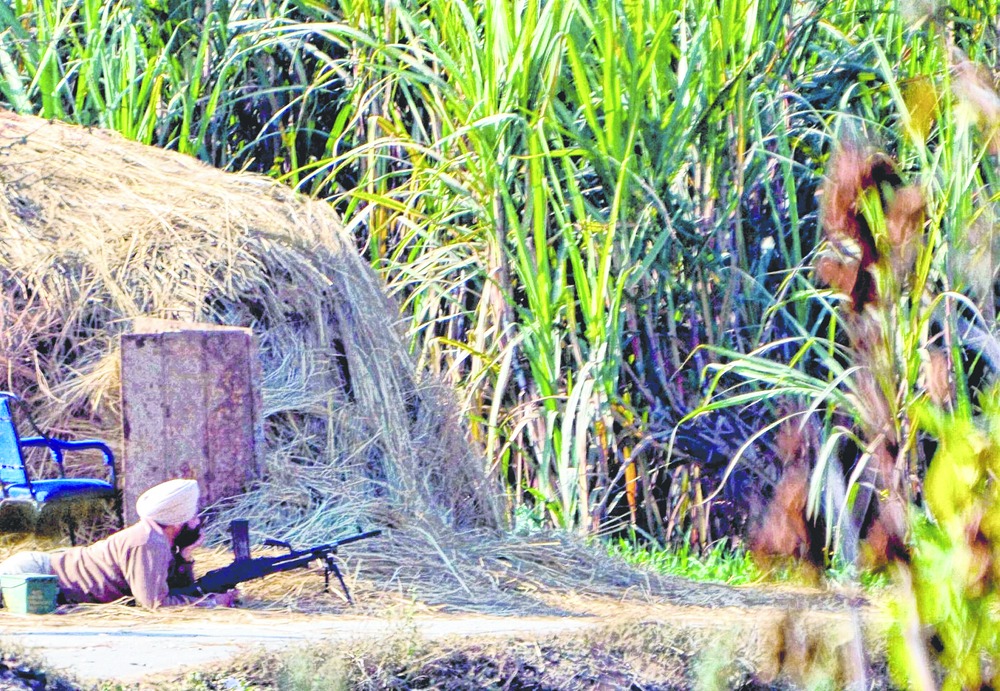
New Delhi, Jan. 8: A "surprise exclusion" of Indian Police Service officers from 24 of Punjab's 27 districts may have contributed to the security lapses in the lead-up to the Pathankot attack, Union home ministry sources have suggested.
They argued that IPS officers would be far less likely than local police and politicians to collude with the state's notorious drug mafia, which is believed to have facilitated the terror strike on the airbase.
Only three directly recruited IPS officers are posted as senior superintendents of police in the border state, the sources said. Local Punjab Police Service officers, including nine IPS promotees, are in charge of the remaining districts as senior superintendents.
All the eight border districts including Pathankot, each tagged "highly sensitive", have only local police officers as senior superintendents.
"We had no idea of this dichotomy in police posting in Punjab. The state government has been asked to look into it," a senior North Block official said.
Intelligence inputs suggest that the terrorists infiltrated into India through the established drug-smuggling route and received logistical support from the mafia and their police accomplices.
Outgoing Gurdaspur superintendent of police Salwinder Singh, under the scanner after being allegedly kidnapped by some of the terrorists who appear to have used the officer's car to travel close to the airbase, is from the Punjab Police Service.
Security experts said IPS officers, who come from various parts of the country, generally lack connections with such local rackets but local politics keeps them out of district police chiefs' jobs.
"Punjab police are completely politicised. These state service officers are handpicked by their political bosses. Their local network is very strong and since they connive with their political masters in illegal activities, these go unnoticed," a former BSF director-general said, requesting anonymity.
"IPS officers do not have such local links as they come from different parts of the country. This makes it difficult for them to engage in large-scale corruption."
Union home ministry figures show that Punjab has 142 IPS officers - 52 direct recruits and 90 promotees - against a sanctioned strength of 172.
"There are enough directly recruited IPS officers in the state. It's beyond logic why the state government favours Punjab Police Service officers and promotees in appointing district police chiefs rather than young, directly recruited IPS officers," a ministry official said.
He added that 66 per cent of directly recruited IPS officers are supposed to be posted to the districts. "But IPS officers eligible for district postings are marking time at police headquarters in Punjab."
In Bengal, two-thirds of district police chiefs are direct IPS recruits.
"It's unfortunate that so many IPS officers in Punjab are posted at the police headquarters, which is not actual policing," former CBI director Joginder Singh told this newspaper.
Punjab deputy chief minister and home minister Sukhbir Singh Badal, however, said Punjab had one of the most professional police forces in the country.
"Police posting is the discretion of the state director-general of police; the state government has nothing to do it," he told The Telegraph outside North Block, where he had come to meet Union home minister Rajnath Singh.
"Punjab Police Service officers have been appointed as SSPs and SPs given their long experience in the state - they know their areas inside out."
Sukhbir dismissed the accusations of collusion between the drug mafia and Punjab's politicians as "baseless".
A former deputy superintendent of police, Jagdish Singh Bhola, was booked in a Rs 600-crore synthetic drug scam in the state. He had reportedly implicated state revenue minister Bikram Singh Majithia, younger brother of Union minister Harsimrat Kaur Badal, the daughter-in-law of chief minister Parkash Singh Badal.
"It's all the creation of media and Opposition parties. None from our party or government is involved," Sukhbir said.
He blamed "black sheep" in the BSF for the drug racket. "Two BSF jawans were arrested yesterday on charges of facilitating drug-smuggling near the border," he told reporters at North Block.
"They (the BSF) are responsible for the drug-trafficking and not Punjab police."
Sukhbir said the drugs came from Pakistan and Afghanistan. "Punjab has become the transit point for these drugs, which are transported to several cities including Mumbai, Calcutta and Goa."
He said he had asked Rajnath for more security personnel along the Punjab border in the light of the repeated terror attacks in the state.
"The number of BSF jawans in Punjab is less than half the number in Jammu and Kashmir," the minister said.
Lie test
The National Investigation Agency, which is probing the Pathankot attack, has asked Salwinder to come to its Delhi office on Monday and have his statement recorded.
"A polygraph test will also be conducted on him," a senior agency official said.
Sukhbir said the law would take its course against Salwinder if he were found guilty.
Last evening, the Pathankot civil hospital conducted autopsies on the bodies of the six slain terrorists. "Their tissues have been preserved for DNA sampling," the agency official said.
DNA samples have been collected also from the vehicles used by the terrorists and are being sent for forensic tests.
Footprints suspected to be of the terrorists have been lifted by forensic experts from the border village of Bamihal -the alleged crossover point - and from within the airbase and sent to a forensic laboratory.
The terrorists used AK rifles, pistols, grenades and assorted ammunition. They carried food and medicines. The airbase is being searched to recover any other evidence they may have left behind.










